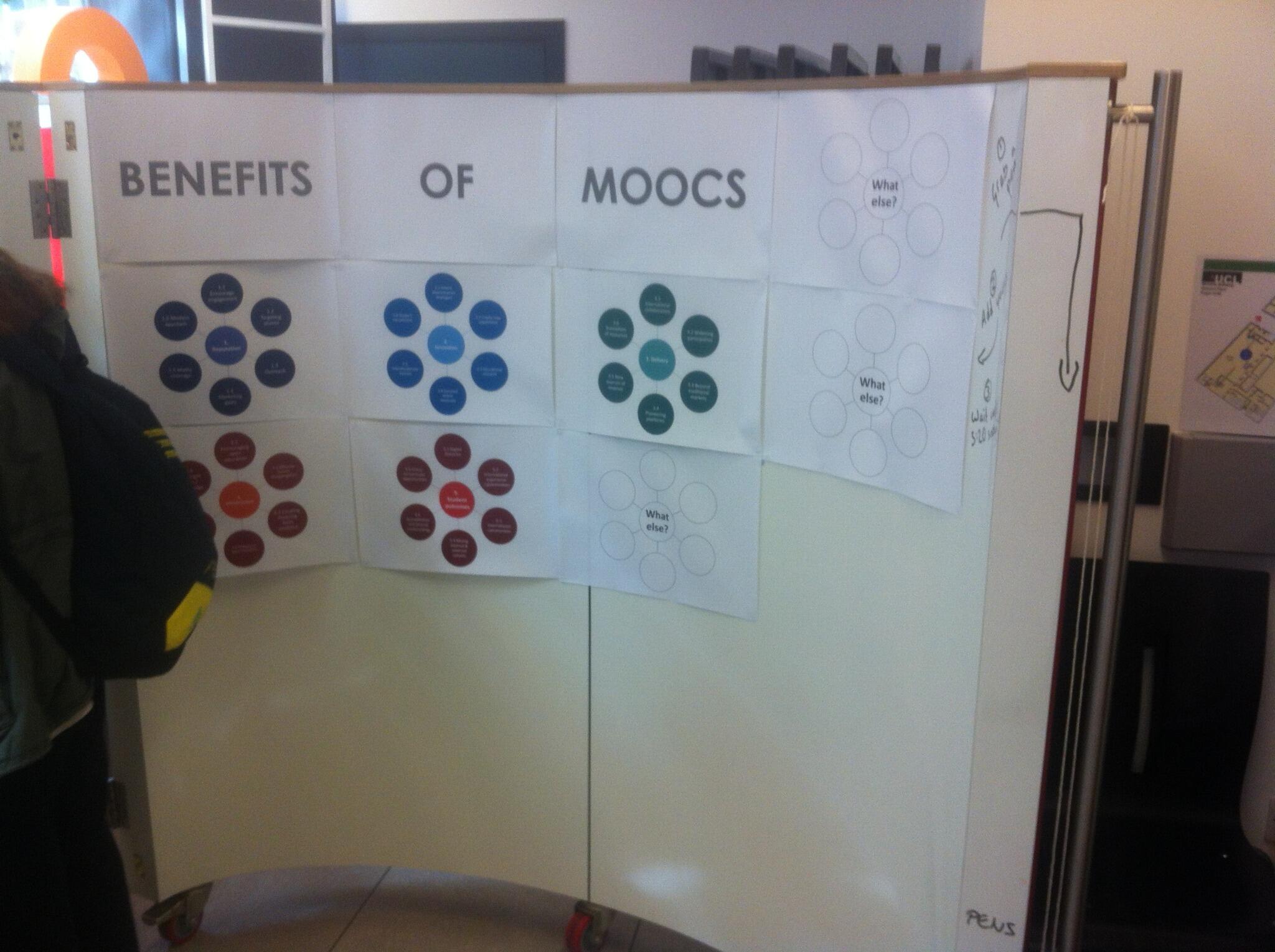Benefits of MOOCS? More science needed!
By Matt Jenner, on 11 August 2014
Nearly six months ago I blogged about the benefits of MOOCs. I broadly categorised them into six main themes, each with six sub-themes. I’ve yet to see any contrasting work in this area so I’ll be flagrantly rude enough to say this is the most comprehensive list in the existence of all human knowledge. If that’s not enough to provoke a response, don’t worry, I’ve got more wild claims to come.
ALT MOOC SIG
What? The Association of Learning Technology, Massive Open Online Course, Special Interest Group, met at UCL for their second session in June 20114, around 80-100 people turned up to discuss the latest and most important areas in the field of ‘MOOCs’. During this day many talkers relieved me from concerns my list of 36 was going to be torn apart. Firstly, the talks mentioned some key areas that I felt were already ‘covered’ in the themes, the most cited were:
- engagement;
- enriched resources (like rich media);
- public engagement / widening participation;
- OER / open educational resources.
Secondly, I was foolish enough to let people physically tear my list apart – it was printed, put up on boards and with pens dangled from strings a welcome invitation was left to add/edit/destroy whatever was missing/incorrect/hideous. We had some of the most provocative and innovative thinkers in this space in the world. So, without making a second grandiose claim, I felt like it was ratified, a bit. Or they were suitably distracted with good networking and yummy sandwiches, as I set this part as a lunchtime task!

Benefits of MOOCs? Add yours!
And then we did some science.
I was graced with the last session of the day, which means everyone is awake, the technology is working and nothing can fail. *sigh*.
- The technology let me down (blame the user; I made multiple mistakes)
- We had halved; with a head-count down to 41 people.
The original data (six themes, 36 sub-themes) was derived from researching 27 papers on the topic of MOOCs from the experiences of people who’s been active in this area. References for benefits of MOOCS – some academic nuggests and references.
The design of my session was simple, in theory:
- Present each theme
- Ask audience for some demographic data
- Audience votes for a single ‘top runner’ sub-theme per theme
- Six sub-themes, one for each theme, end up as the collective ‘best benefits of running MOOCs’
- Profit (somehow).
This didn’t go quite to plan, and if you feel like some light relief, here’s a somewhat comedic approach to science, where the presenter (hi!) makes a fool of himself for 25 minutes while trying to interact with the audience.
But the results are amazing. In spit of the pain; here’s some data to chew on:
Benefits of MOOCs?
Reputation

Reputation – Outreach takes the lead as Encouraging engagement and Marketing gains seem like close runners. No-one does this for Alumni or Media coverage?
Innovation

Innovation – Creating new capabilities knocks the socks off the others. But we had the most technological failure on this part. Needs more science.
Delivery

Delivery – Widening participation and going Beyond traditional markets are clearly the front runners here, but the others are not too far behind. Translation, however, is not a benefit of MOOCS? That might change.
Service improvement

Service improvement – Pedagogical experimentation and Encouraging open education lead the way here, but perhaps in the future this might change? Or our term of ‘Service Improvement’ is too Blue Chip for you all! (Sorry)
Student outcomes

Student outcomes – hurrah, an even mix. This says a lot about the initial benefits of MOOCs, or at least we’re hoping that students are gaining something.
Others

Others – anything we missed on the boards was included here, so the numbers are higher, but they can be incorporated along the way.
Conclusion (so far)
It would seem, at this stage, that the top six benefits of running a MOOC are:
- Gain further outreach into demographics, cultures or locations.
- Creating new capabilities for teaching and learning.
- Widen participation with a larger cohort than traditionally reached
- Improve services, of offerings, via the opportunities of pedagogical experimentation
- Raise digital literacy up the agenda, or pave some way to making some kind of improvement(?)
- For the offering of taster courses, perhaps with a view to sampling university life or what it means to study at a particular institution.
But this isn’t enough – we need to get more people answering, increase the number of contributions and ascertain what are the true benefits of MOOCs.
Take part – become a statistic!
It’s not every day you get to be a statistically relevant being, make your mark and contribute to our poll. This will increase out small data set and ensure we’re working with the best data possible.
Leaving note:
I have original paper with many citations etc which started all this work – I’ll publish it separately.
Data junkies:
- Raw data from the ALT MOOC SIG session – as captured by TurningPoint Some of these failed, watch the video to see which data are relevant.
- Formatted data from ALT MOOC SIG session asking 41 participants their views. Split by demographic and a range of questions. All the data used here created the charts above.
 Close
Close

